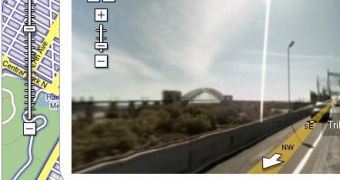Google has been facing some problems in Germany ahead of launching its Street View service in the country. Last month, German data protection officials urged Google to change some of its practices to better comply with the country's privacy laws, and now Johannes Caspar, head of the Hamburg data protection agency, has announced that Google has agreed to all of the changes requested by the officials and will delete raw photos it keeps internally. Several issues were raised by Caspar in May and while the Mountain View-based company complied to most of the requests the problem with the raw photos remained unresolved.
Google Street View is a complementary service for Google Maps, which allows users to watch panoramic views of many major cities around the world. The service isn't available in Germany yet but the search giant has begun taking the photos needed in preparation for the launch.
Google deploys a software solution that automatically blurs people's faces and car number plates in order to protect privacy, but in order to improve the technology it would have to store the raw photos coming from its Street View cars even after they have been processed. A more detailed explanation on how the technology works and what Google is doing concerning privacy issues in Street View can be read here.
Almost a month after the data protection officials' request the two parties have reached a compromised that is mutually accepted. The Mountain View company will delete the raw photos but only upon user request, meaning that people will have to apply beforehand to remove their faces or number plates. Caspar stated that, while this wasn't what the agency originally wanted, it was happy with the arrangement. Street View has been met with reluctance in a number of countries in Europe but also in Japan. However, Google has been so far cooperative and adapted its practices to suite the local requests.

 14 DAY TRIAL //
14 DAY TRIAL //